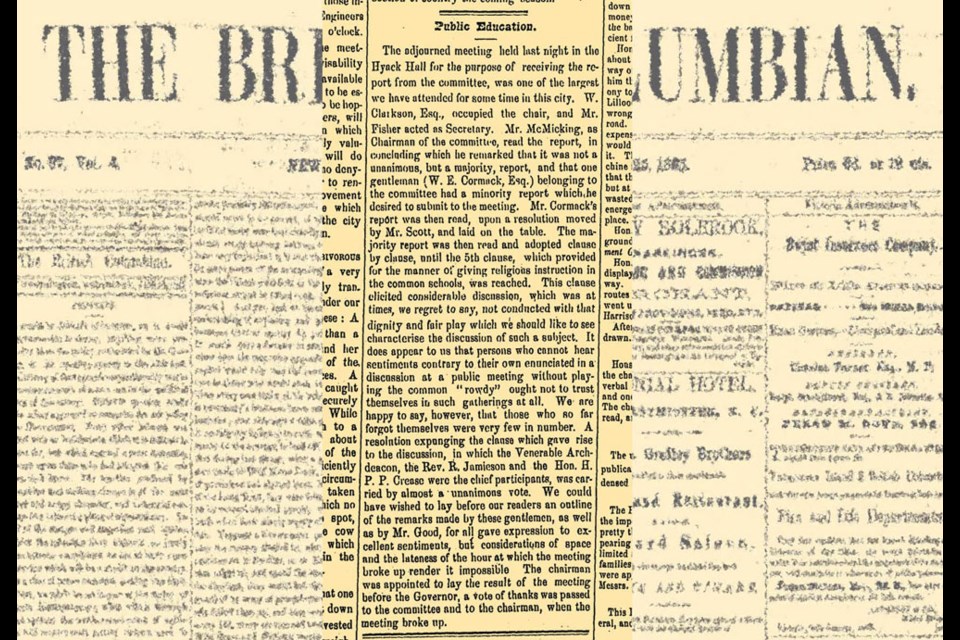New Westminster is a city full of history — and that history includes a variety of community newspapers over its many decades.
In a new weekly series, we're taking a look back at the headlines from some of those newspapers, shining a spotlight each week on a notable news story, person or moment from this week in New West history.
This week, we travel back to 1865.
Does religious instruction belong in public schools?
It's not a new question — in fact, a dive into New Westminster newspaper archives shows it's a very longstanding question indeed.
The issue came into the spotlight in the Jan. 25, 1865 edition of The British Columbian newspaper, as the paper reported out on a public education meeting held in the Hyack Hall.
The meeting, chaired by W. Clarkson, Esq., saw a less-than-genteel discussion about the question, if the British Columbian's reporter is to be believed, as two factions discussed a school report with apparent civility until reaching a clause about "the manner of giving religious instruction in the common schools."
"This clause elicited considerable discussion, which was at times, we regret to say, not conducted with that dignity and fair play which we should like to see characterise the discussion of such a subject," the newspaper account reads. "It does appear to us that persons who cannot hear sentiments contrary to their own enunciated in a discussion at a public meeting without playing the common 'rowdy' ought not to trust themselves in such gatherings at all."
The Venerable Archdeacon, the Rev. R. Jamieson and the Hon. H.P.P. Crease were the chief participants in a discussion expunging a clause around religious education. What exactly the debate entailed isn't entirely clear from the article, as the writer proceeded:
"We could have wished to lay before our readers an outline of the remarks made by these gentlemen, ... but considerations of space and the lateness of the hour at which the meeting broke up render it impossible."
Who is to blame for ‘godless’ education system?
The whole matter didn’t go away quite that easily, however. A few editions later, on Feb. 4, 1865, The British Columbian ran a lengthy letter to the editor from a reader (signed only as “Colonist”) attempting to set the matter straight.
The writer was highly critical of the committee choosing to reject a proposal that would have let each school section, through their elected trustees, decide whether or not to have Scriptures read at their opening and closing exercises.
“It seems the people here cannot be safely entrusted with the same liberty as other colonists,” wrote the indignant colonist.
The writer also expounded on the committee’s rejection on other aspects of religious instruction, specifically:
- refusing to recommend that all schools be opened and closed with prayer;
- refusing to recommend that the Ten Commandments be taught to all pupils; and
- refusing to recommend that clergy should have the right to give religious instruction to the pupils of their own church “and any others who may voluntarily remain,” in each school district at least once a week, before or after the regular school day.
“Seeing the spirit manifested by the leader of the Church of England here, and so many of his followers, it may be just as well to adopt the secular department of the U.C. (Upper Canada) system, as has been done, and omit the religious altogether; but it is right to know who rejected it; and if the cry be raised here as elsewhere of ‘godless education,’ let the public and posterity know who is to bear the blame,” the unnamed colonist waxed on.
We're still not entirely sure we know what happened at the meeting. But it's good to have proof that the fine New Westminster tradition of irate letters to the editor has its roots in history.
Follow Julie MacLellan on Twitter @juliemaclellan.
Email Julie, [email protected]



